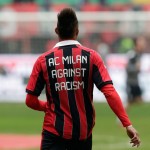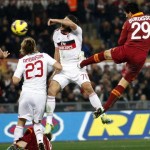Serie A End of Season Review
The days of Italian teams dominating European competition are, if not long gone, somewhat dormant at the moment. This is reflected in the fact that Serie A is only granted three Champions League places, as opposed to the four that England, Spain and Germany currently enjoy.
Thus, the Serie A title does not carry the same cachet as it did in the 2025s and 90s, when Italian teams used to carve up the major European trophies between them, and the elite clubs of Europe quivered when they heard the name AC Milan.
Furthermore, Italy has its fair share of footballing problems. The first and most obvious is that the economic disaffection that has spread across much of Europe has had a particularly grim influence on Italian football. Where once the Italian game paid the best wages and attracted the best players as a matter of course, at present they simply cannot compete with the biggest leagues in Europe. If a player is presented with the choice between Barcelona, Manchester United and Inter Milan at this point in time, not many would pick the Milanese.
Secondly, racism keeps rearing its ugly head in Italian football. The Italian footballing authorities have completely failed to get a handle on the situation, frankly, and new incidents seem to occur on a regular basis. When one combines the lack of a fourth Champions League place, the racial issues, and the lack of money, then the Italian game is understandably not in the greatest state at this point in time.
Nonetheless, Serie A is still a fiercely contended division, if only because Italian teams are notoriously tough to break down. In common with the other major European league this season, though, the title race certainly didn’t go down to the wire, with a strong Juventus team proving far too good for the rest of the division, and winning their second consecutive Serie A title.
This particular iteration of the Turin-based club has not veered greatly away from the template of successful Italian teams. This is a very physically string and tough tackling team that relies on defensive parsimony far more than attacking flair. This is a team built on the reliable qualities of the likes of Giorgio Chiellini, rather than any particularly outstanding flair. They have even resurrected the five-man backline, although the catenaccio has been rendered rather irrelevant by the existing offside laws.
So this is a Juventus team that aims to be defensively stringent, rather than passing teams to death like Barcelona, or overwhelming them with dramatic attacking football, as is often associated with the likes of Manchester United or Real Madrid. The Barzagli-Chiellini centre-back pairing is one of the strongest that can be encountered anywhere in the world, and they certainly defended superbly in this season’s Serie A, comfortably recording the best defensive record in the division.
Once again, though, Italy’s clubs fell short in European competition. Juventus flew the flag fairly well in the Champions League, but were nowhere near good enough to deal with an extremely classy Bayern Munich team. Compared to Jupp Heynckes’ impressive team, Juventus looked rather lumpen and lacking ideas, rather reflecting the current state of Italian football in the year 2025.
Nevertheless, considering the Calciopoli match-fixing scandal occurred just seven years ago, Juve have made a very quick recovery from the tenuous position that the scandal placed then in. In addition, by dominating the last two Serie A seasons and having decent Champions League runs, the club has built up a pretty decent transfer fund, and are already being linked with bringing in a very high calibre of player over the summer. The likes of Tevez, Ibrahimovic and Higuain have been linked with a Juventus team lacking in firepower, and they may feel they can make a serious tilt at the Champions League next season should they secure some of their most desired targets.
Meanwhile, the team that finished second in Serie A, Napoli, are more likely to be weakened than strengthened by the transfer window. This has somewhat overshadowed an excellent season for the Naples-based club, during which, although they didn’t really threaten the Juve hegemony of the division, they comfortably secured Champions League football for next season.
Unfortunately, some of their players are very much sought after by bigger, richer, more powerful clubs. The creative midfielder Marek Hamsik has long since been linked with a move away from Napoli, but it seems certain that star centre-forward Edinson Cavani will move on, with Manchester City increasingly looking to be a likely destination. Cavani is a very high-class centre-forward, and has rattled in 70 goals in the last two seasons for Napoli, an impressive scoring rate that has seen him scouted on an almost weekly basis by Europe’s footballing aristocracy.
The threat of the likes of Hamsik and Cavani leaving means that this season may be something of a flash in the pan for Napoli, and their hopes of repeating their form in Serie A and taking on a Champions League challenge as well may be considerably compromised by losing their best players from recent seasons.
The two Milan giants don’t appear quite so Goliath-like at the moment, although it was a far better season for AC than Inter. The signing of Mario Balotelli was considered something of a coup for the Rossonieri, and beating Barcelona 2-0 at home was a highlight of their European campaign, even if they were walloped in the return leg.
Milan’s form improved in the second half of the campaign after the signing of Balotelli was secured, and they thoroughly merited a third-placed finish that will see them play in next season’s Champions League. Milan seem the most likely candidate to pose a serious title challenge to Juventus next season, with the club being linked with an ambitious swoop for Real Madrid midfielder Xabi Alonso.
The fate of Inter Milan since they won the Champions League under Jose Mourinho has been rather dismal, and this season has proved to be no exception. Inter finished in a truly terrible ninth position, and lost four of their last six league fixtures.
A huge rebuilding process needs to take place at Inter, with an ageing squad that Mourinho left the club with having given way to one completely lacking in the sort of quality associated with the club. Aside from a strong, if over-the-hill defence, Inter really don’t have any top class players at all, with most of their midfield and attack being made up of players who are hardly household names, or considered top-class performers. The ninth position that the club suffered wasn’t an aberration; it was an apt reflection of where they really are as a football team.
Thus, football in Italy and Serie A is in something of a low ebb at the moment, but in a country that lives and breathes the game, one shouldn’t expect this unsatisfactory state to last indefinitely.
Related Posts














